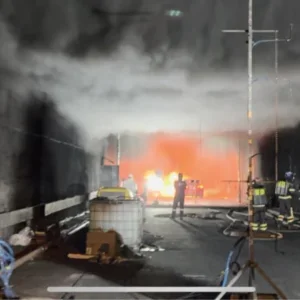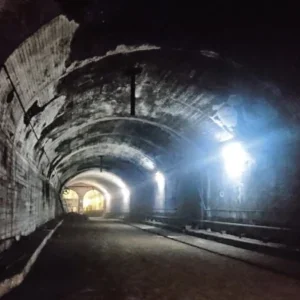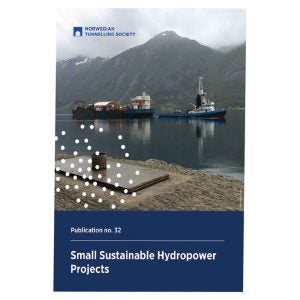The Harding Prize was established in 1974, upon Sir Harold Harding’s retirement as founder chairman of the British Tunnelling Society (BTS), in acknowledgement of his contribution to the tunnelling industry and his support of the development of young engineers.
The engineer
Born in the first week of 1900, Harding lived through an exciting and burgeoning era of tunnel construction – as an engineer, contractor, consultant and writer.
In 1922, shortly after graduating from the City & Guilds Engineering College in London, Harding gained a position as a junior engineer with John Mowlem & Company and quickly began to address what he later described as his “ignorance and need for practical experience”.
Working under William Rowell, who was a contemporary of Greathead and whom Harding described as “probably the most experienced engineer in soft ground tunnelling and deep foundations in this country”, Harding rapidly earned a name for himself as a talented young engineer. A peak achievement in his first 10 years with Mowlem was a three-year stint as engineer in charge of the reconstruction of the Piccadilly Circus tube station. The whole station, including the ticket hall, was constructed in headings from a single shaft in order to avoid surface disruption.
In the years to come Harding worked on numerous notable projects and became know as pioneer in the use of chemical injection and groundwater lowering. He was a huge advocate the ‘new science’ of soil mechanics, and was famously quoted as saying: “One of the turning points in the history of civil engineering is the conversion of the profession to the gospel of soil mechanics, of which Terzaghi was the true Messiah.”
Harding left his post of director with Mowlem in 1956 to set up as an independent consultant. In this role he worked on over 400 assignments, giving advice on practical, technical and contractual matters in Britain and overseas. For 13 years, from 1958 until late 1971, Harding and his colleague René Malcor led the Channel Tunnel Study Group.
In 1963, Harding was elected president of the Institution of Civil Engineers (ICE), excelling in this leadership role, subsequently he chaired numerous ICE committees and Code of Practice drafting panels. He was knighted in 1968 and was particularly pleased to learn, shortly before his death in March 1986, that the Channel Tunnel had at last been given the go-ahead.
The mentor
Harding displayed a brilliant combination of technical and practical engineering skills throughout his career. He was also well-known for his talents as an author, a witty and inspiring public speaker, and also as a mentor to younger engineers.
John King, who himself became a director of Mowlem and a founding committee member of the BTS, recollects Harding’s guiding influence: “I first became aware of Harold Harding soon after I joined Mowlem as a young engineer fresh from university. There was a strong aura of technical application in everything we did and this came from his direction – the application of sound engineering techniques. He provided an immense presence in the company and a great impact on young civil engineers.
When you encountered Harding in the office, or corridor, he would always engage you in conversation – enquire what work you were engaged upon, what you were learning and whether you were applying sound engineering principles. He invariably finished by imparting some Harding words of wisdom, such as ‘believe nothing you hear and only half of what you see’. He had an amazing memory and would sometimes question me on technical decisions I had made months before.”
The Harding Prize
Harding strongly believed that young engineers should be encouraged and felt that writing and presenting papers provided invaluable experience. Thus, the establishment of a biannual award for best paper and presentation by a young engineer was a fitting tribute to his efforts.
The competition is designed to encourage younger members of the profession to write about the assignments they are engaged in to help disseminate new ideas and techniques being used in the industry.
Past years’ finalists have benefited in many ways from taking part in the competition, gaining valuable experience in writing for publication (in T&TI), public speaking and addressing questions assembled senior society members.
Numerous past winners have gone on to become well-known and respected names within the industry: Trevor Orr, who was the winner of the first Harding Prize Competition, in 1975, is now an a lecturer at Trinity College, Dublin; and Gordon Masterton, who won in 1981, is this year’s president of the ICE.
The international competition is open to anyone up to the age of 33. Entrants should submit an original paper (between 2500 and 4000 words, including relevant illustrations) relating to any aspect of tunnelling they consider of interest to those in their industry. Finalists will be invited to present their papers at the April 2007 meeting of the BTS, at the ICE, in Westminster, London. The closing date for submissions is 30 January 2007.
So, if you are a young tunneller, here are some Harding words of wisdom: “Have a go. Even if you don’t win, you can’t lose.”
And, if you are not (such) a young engineer, maybe you also could benefit from some of Harding’s wisdom and take part in some mentoring of your own. Encourage the younger members of your team to take part.
For more information on entering the Harding Prize Competition, and a full set of rules and guidelines, please email: bts@britishtunnelling.org






